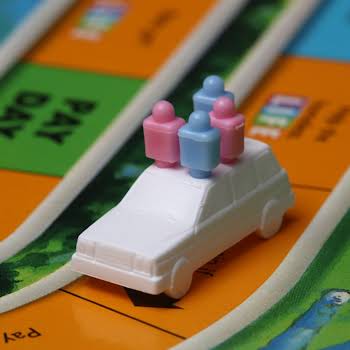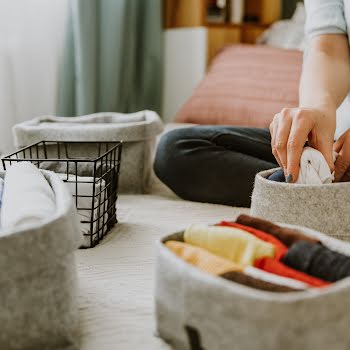
How to be an emotionally attentive parent (and not pull yourself apart in the process)
By IMAGE
07th Jun 2022
07th Jun 2022
Nowadays we are thrown profound quotes like confetti – to be enjoyed for a split second and then forgotten about, lying mashed into the sole of our shoes. So, it’s refreshing and disarming to read a quote that, well, grabs your attention. Like this one by the French philosopher Simone Weil:
“Attention is the rarest and purest form of generosity.”
This one made me stop. My mind went quiet because there’s not a whole lot to say in response to it. There is so much truth to it I don’t want to taint it by intellectualising it. A part of me just wants to Be it, generously attend to its power and truth.
I can’t help myself, though, so I am going to say a few things about attention and being a parent. A few brief things, because, after all, your attention is beyond precious.
The science of attention
We know from studies of the brain that our neurons fire more rapidly when we attend to something in our awareness – be it a spoon or a shoe. These neurons form pathways in the brain that light up and the more we attend to the something, the stronger that pathway becomes. That’s because, as neuro-psychiatrist Dr. Dan Siegel says, “Neurons that fire together, wire together”.
Consider the spoon: If we attend to a thought about a spoon for many hours a day, our ‘spoon’ neural pathways become stronger and light up more quickly when spoons come into our awareness. This example, albeit a little silly, is intentional as it highlights how powerful our attention is: the more we think about something and pay attention to it, the stronger those pathways become in our brains. The more we energise certain thoughts, the more think-able they become. All through the power of attention.
That’s the essence of neuroplasticity: we shape the brain’s neural pathways by what we focus our attention on. A scientific fact that social media algorithms are engineered on.

We feel the power of attention
Staying with the science for a moment, studies have also shown us that there are certain pathways in the brain called resonance circuits that light up when we are being present with someone — when we listen to them and attune to what they are saying, when we ‘see’ them.
Our brains can feel it when someone is being present with us. Feel-good neuro-chemicals of connection get released and in turn, we feel the better for it. This, essentially, is the power of presence.
We all know when someone is present with us: that subtle yet distinct feeling that the other person is ‘with’ you – they get it, they get you. Things feel easier, we feel understood. We feel more integrated, as I explored in my last piece.
We are in a Connection State: we feel self-connected, we are better able to communicate with others, to pay attention, to come up with solutions, to pause, to reflect, to collaborate — all the experiences that are so important for our optimal functioning in this world.
So, when we are present with our children, they feel it.
When we are present with ourselves, we feel it.
When we are present, everyone is the better for it.
The tension of parental attention
I know the scientific facts I have just cited to you.
But I also know how HARD it is to give our undivided attention to whatever it is we are attending to. I know this because I’m a parent and a human in the technology age where our attention has become a precious and stretched commodity with every beep and notification, with every demand and every time our name is called, in varying tones, by our children.
And therein lies the conflict: attention appears to be finite, and yet as parents we are asked to give it ad infinitum.
The attention paradox
I’m writing about this NOT to add another layer to the tightly woven fabric of parent-guilt that tells you what you should be doing and, if you’re not, you have somehow failed. Again.
Instead, I want to share with you that the only way we can make peace with attention — so that it feels less finite and more spacious, flexible, and well, generous – is to give ourselves more of it.
I know this may seem like another one of those paradoxes that may read well as a social media post, but has zero real-life value, but it’s not. I promise.
Scientific research has shown us that the more self-connected we are – when we feel grounded and anchored — the better our brains are at paying attention. It also tells us that attention begets more attention. Remember, the more we attend to something, the stronger that pathway gets, so the more we attend to attention, the more attention there is.
What that means is that the best way to strengthen your attention and be generous with this rare gem, is to start with yourself.
Give it a go
If the above feels like an impossibility, or you don’t even know where to start, give the following a go, and see how you get on:
- Brief moments of self-connection: The brain is better at paying attention when we feel self-connected. So, practise micro-moments of connecting with yourself throughout the day: stopping to look out the window at a bird in flight as you load the dishwasher; closing your eyes at your desk and feeling your two feet on the floor; breathing into your heart and welcome yourself to yourself. These all take seconds, and the more we practise them, the more available they become.
- Unplug a little more: Technology grabs our attention — the more attention we give it, the stronger our ‘technology’ pathways become. It takes conscious effort to choose not to attend to our devices as much. Consider the nature of your relationship with your devices, and how you can consciously choose to give them a little less of your attention. Take small steps.
- Switch lanes: Switching attention from one thing to another is really hard – the brain doesn’t like it at all. So, when you are in the middle of something and have been interrupted for the 17th time, take a breath, connect with yourself, and remember that it’s how the brain rolls. Give yourself some slack and imagine yourself switching lanes on a motorway, it takes effort and a little time. You can always switch back lanes when you have met the demands that are being asked of you.
- Balance and boundaries: In this post-lockdown world, our sense of boundaries between work and home life has been totally re-written. Finding what works for you in putting some boundaries in place with your children can be helpful, and remember, your definition of balanced boundaries may be different to the next person’s. That’s OK. What’s most important is that the boundaries you have feel right for you and your child. If they don’t, reflect on how you might be able to make them more workable. Depending on the age and needs of your child, you can share with them how you are finding it hard to find a balance and might they have some ideas? Seeking their input and investment is a great way to initiate change in parent-child relationships.
- Go gently: As always, go gently, be kind to yourself, your brain and all its pathways.
© Julie Meehan, 2022.
Dr Julie Meehan is a clinical psychologist, parent guide and (imperfect) parent.
Dr Julie has developed an evidence-based, step-by-step pathway for parents to follow that guides you to create more connected and trusting relationships with yourself and your child, allowing you both to meet and grow from life’s challenges, and to thrive.
You can follow The Pathway Home for Parents through Online Self-study Courses, Live Programmes and through Dr Julie’s One to One Parent Guidance Packages on www.juliemeehan.com.
Join Dr Julie for a Free Webinar for parents of children aged 4-18 years on Befriending Big Emotions: 3 Steps to Emotional Balance for You and Your Child. To learn more and to register go to www.juliemeehan.com/befriendingbigemotions























